Are you tired of the constant barking and yapping that often accompanies owning a dog? Well, prepare to be pleasantly surprised by the Basenji – a breed that defies the norm with its unique barkless trait.
But that's not all that sets this captivating breed apart. With its origins in Central Africa, the Basenji has a rich history and a set of traits that make it truly one-of-a-kind.
So, if you're curious to learn more about this intriguing breed, buckle up and get ready to uncover the fascinating world of the Basenji.
Key Takeaways
- The Basenji is a unique breed known for its barkless trait and cat-like grooming habits.
- They are intelligent, independent, and alert, but can also be stubborn.
- Basenjis have moderate exercise needs and require at least 30 minutes of exercise per day, along with mental stimulation.
- With their minimal grooming needs and adaptability to apartment living, Basenjis can make great companions for various lifestyles.
Origin and Size
The Basenji breed originates from Central Africa. They are known for their unique barkless trait and cat-like grooming habits. This breed is a medium-sized dog, weighing between 22-24 pounds (10-11 kg). They belong to the Hound Group and have a lifespan of 12-16 years.
Basenjis have a short, fine coat that comes in various colors, such as chestnut red, black, tricolor, or brindle. Their temperament is intelligent, independent, and alert. They have a strong hunting instinct and can be stubborn at times. Training should be consistent, patient, and use positive reinforcement.
Basenjis require moderate exercise, needing at least 30 minutes of exercise per day. They are also good at agility and obedience training. Grooming needs are minimal due to their short coat, requiring only occasional brushing and routine care.
Basenjis are generally a healthy breed, but they can be prone to certain conditions like hip dysplasia and kidney problems. Regular veterinary check-ups are important to ensure their well-being.
Temperament and Unique Traits
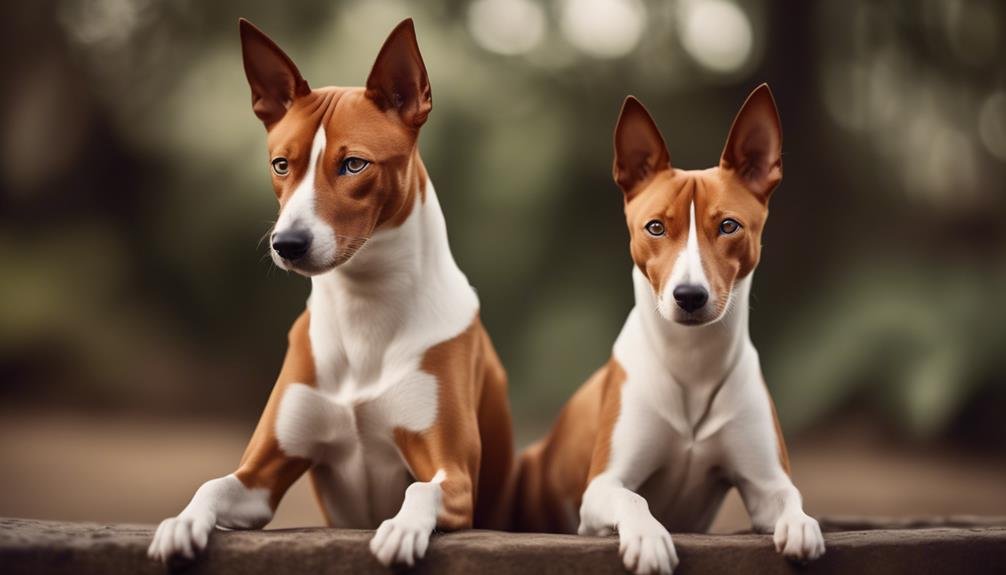
When considering the temperament and unique traits of the Basenji breed, it's important to note their intelligence, independence, and alertness.
Basenjis are highly intelligent dogs that can quickly learn new commands and tasks. However, they also have a strong independent streak, which means they may not always follow commands if they don't see the point. This independence can make training a challenge and requires consistent and patient effort.
Additionally, Basenjis are known for their alertness. They have a keen sense of awareness and will alert you to any potential dangers or strangers in their environment. This makes them excellent watchdogs.
Exercise and Mental Stimulation Needs
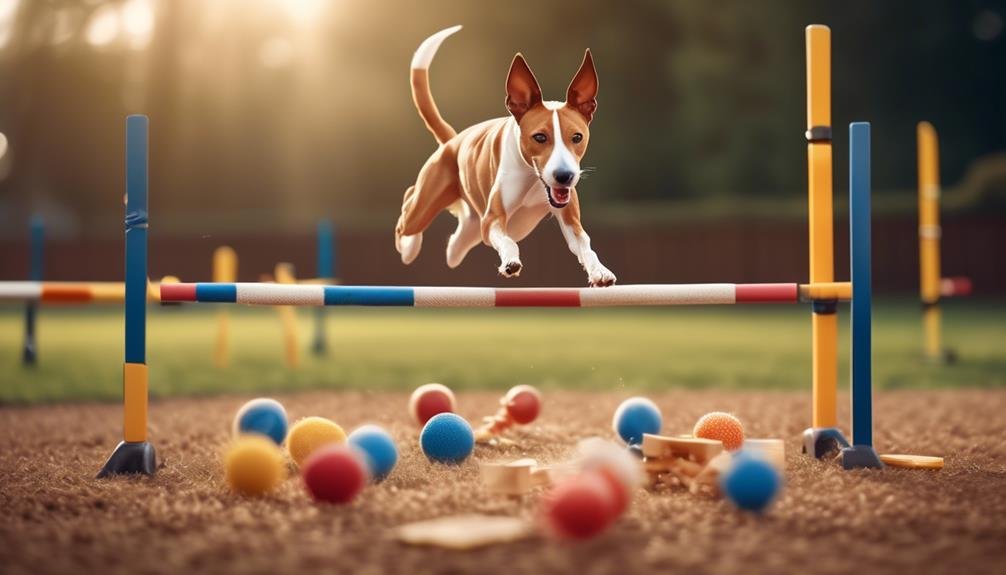
To meet the exercise and mental stimulation needs of a Basenji, it's important to provide regular physical activity and mental challenges.
This breed is known for its high energy levels and requires a lot of exercise to stay happy and healthy. A minimum of 30 minutes of exercise per day is necessary, but more is always better. Engaging in activities like brisk walks, jogging, or playing fetch will help burn off their energy.
In addition to physical exercise, mental stimulation is equally important for Basenjis. They're intelligent dogs that thrive on mental challenges. You can provide this through interactive toys, puzzle games, obedience training, or agility courses. Keeping their minds engaged will prevent boredom and destructive behavior.
Grooming and Health Considerations
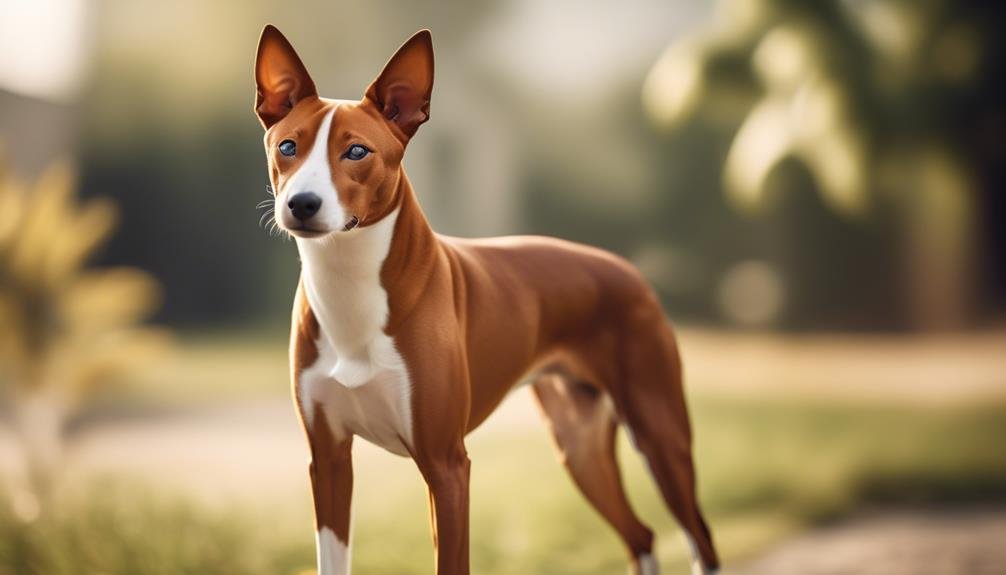
To keep your Basenji healthy and well-groomed, it's important to establish a regular grooming routine.
Despite having a short and fine coat, the Basenji still requires some maintenance to keep it looking its best. Occasional brushing will help remove any loose hair and keep the coat shiny.
Bathing should only be done every few months, as Basenjis are known for their self-grooming habits. Regular nail trims and teeth brushing are also important for their overall health.
In terms of health considerations, Basenjis are generally a healthy breed. However, like any dog, they can be prone to certain conditions such as hip dysplasia and kidney problems. It's crucial to schedule regular veterinary check-ups to ensure their well-being and catch any potential issues early on.
Adaptability to Apartment Living
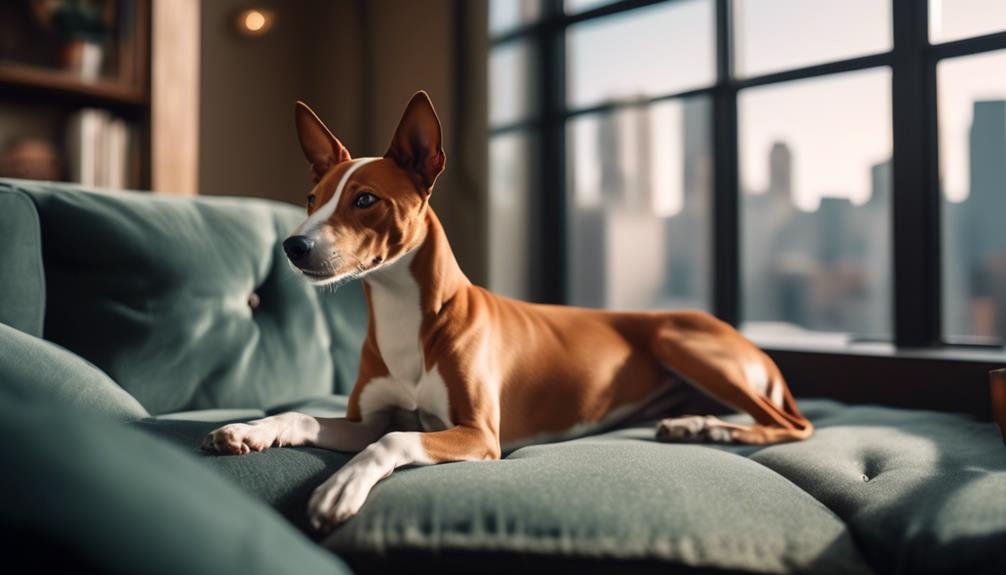
Living in an apartment, the Basenji is an adaptable breed that can thrive in a smaller living space. Despite their medium size, Basenjis have moderate exercise needs and can be content with at least 30 minutes of exercise per day.
They're intelligent and independent, which means they can entertain themselves indoors. Basenjis are generally quiet and don't bark excessively, making them suitable for apartment living. However, it's important to consider the energy levels and behavior of individual Basenjis, as some may still require additional mental stimulation and playtime.
With regular exercise and mental enrichment, Basenjis can adapt well to apartment or condo living. Just make sure to provide them with enough physical and mental activities to keep them happy and well-adjusted.
Aggression, Fear, and Vocalizations
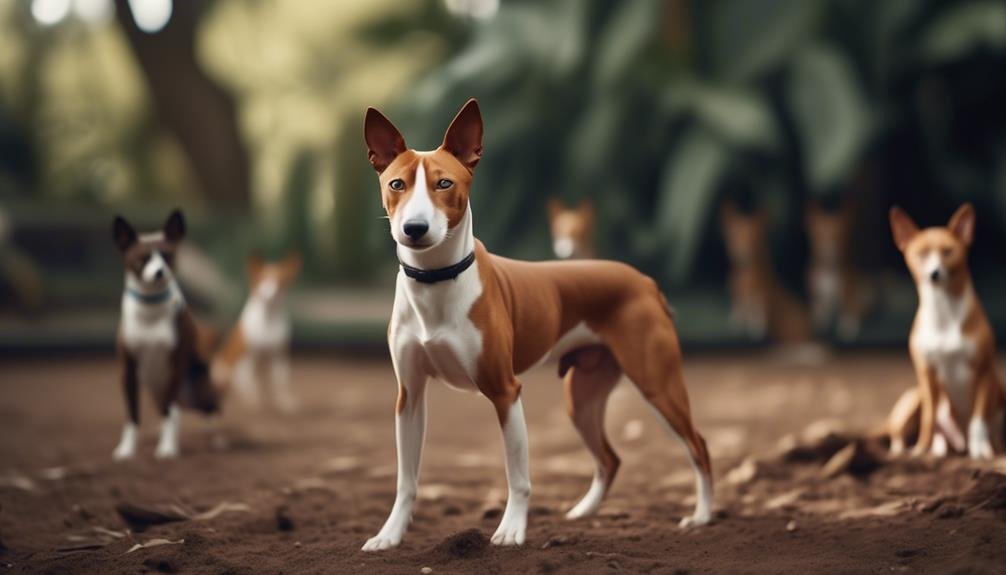
Despite their adaptability to apartment living, Basenjis can display certain behaviors related to aggression, fear, and vocalizations. It's important to understand these aspects before bringing a Basenji into your home. Here are some key points to consider:
- Aggression:
- Aggression in dogs is often driven by fear and anxiety.
- Dog aggression towards humans can be a result of fear and anxiety.
- Aggression can lead to dangerous situations, such as dogs wandering into oncoming traffic.
- Fear:
- Predatory instincts can put dogs at risk of being bitten by snakes or attacked by other wild animals.
- Some dogs with high prey drive may pursue animals while on the hunt, putting themselves in danger.
- Vocalizations:
- Different dog breeds have varying tendencies to bark or howl.
- Hounds may have a natural tendency to howl, which can be either musical or maddening.
- Watchdogs may be on high alert in a city full of suspicious strangers.
Understanding these behaviors will help you provide the necessary training and environment to ensure a happy and safe life for your Basenji.
Wanderlust Potential and Exercise Requirements
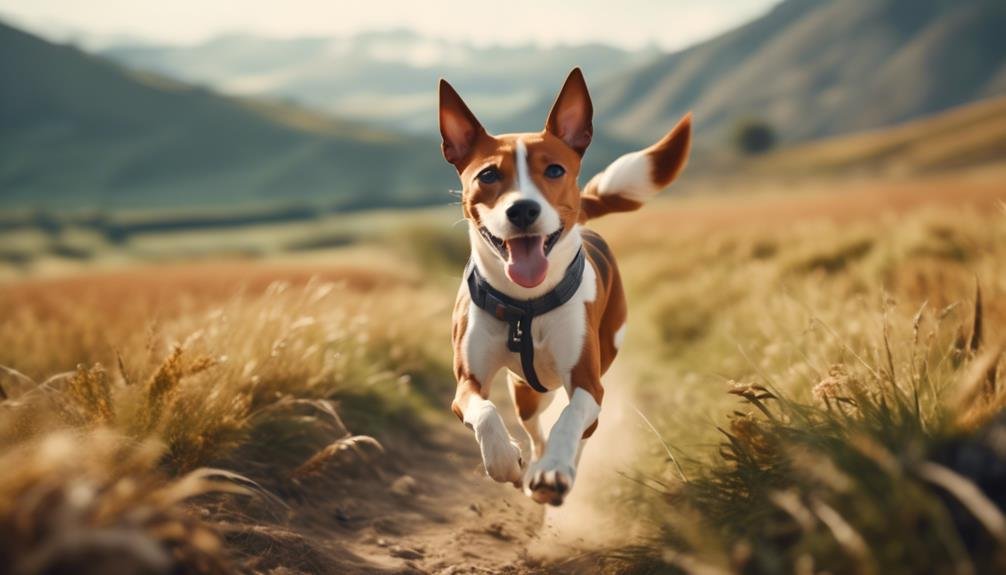
Basenjis have varying levels of wanderlust potential and exercise requirements that should be taken into consideration when choosing this breed. While some Basenjis may have a strong instinct to wander and explore, others may be more content staying close to their owners.
It's important to provide Basenjis with regular exercise to keep them mentally and physically stimulated. These dogs have a high energy level and require at least 30 minutes of exercise per day. This can include walks, playtime, or engaging in activities that challenge their intelligence.
It's also important to note that Basenjis have a strong hunting instinct, so providing them with outlets for their natural behaviors, such as puzzle toys or scent games, can help satisfy their needs.
Playfulness and Basenji Size
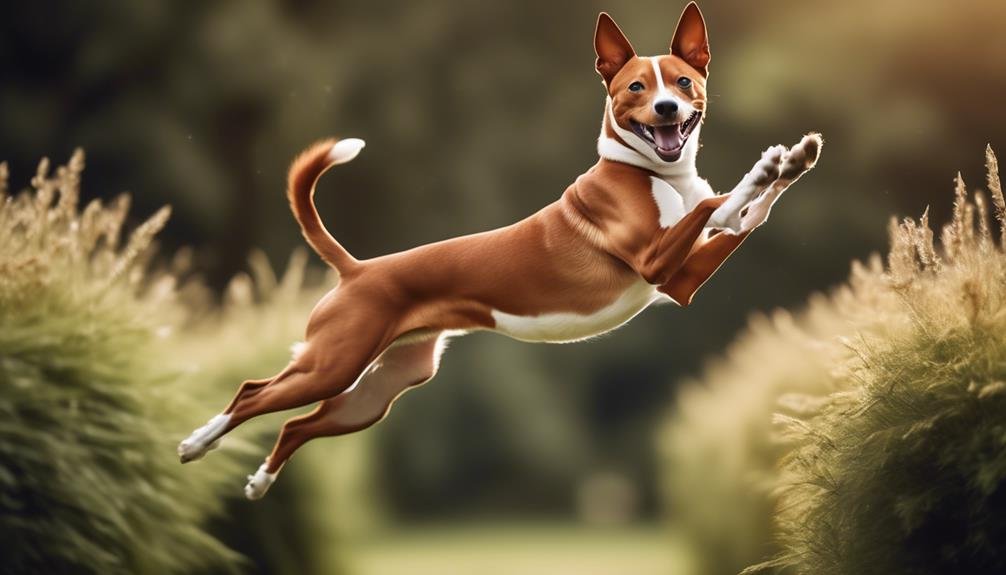
When considering the playfulness and size of a Basenji, it's important to take into account their energetic nature and compact stature. Here are some key points to consider:
- Playfulness:
- Basenjis are known for their playful and energetic personalities.
- They enjoy games and activities that engage their minds and bodies.
- Providing regular playtime and mental stimulation is important for their overall well-being.
- Basenji Size:
- Male Basenjis have a shoulder height of around 17 inches and weigh approximately 24 pounds.
- Female Basenjis are about 16 inches tall at the shoulder and weigh around 22 pounds.
- Their compact size makes them suitable for various living situations, including apartments or houses with limited space.
Basenji Health, Care, and Coat Color
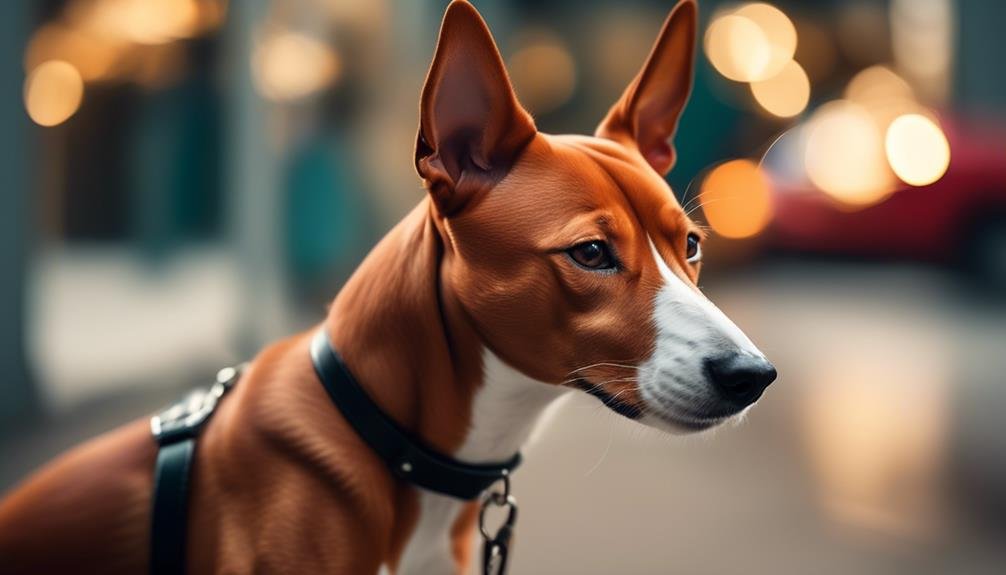
To properly care for a Basenji and ensure their well-being, it's important to understand their health needs, grooming requirements, and the unique coat colors they come in.
Basenjis are generally a healthy breed, but they may be prone to certain conditions such as hip dysplasia and kidney problems. Regular veterinary check-ups are important to monitor their overall health.
When it comes to grooming, Basenjis have minimal needs due to their short coat. Occasional brushing and routine care will suffice. Their self-grooming habits keep them clean, and baths are only necessary every few months. Remember to regularly trim their nails and brush their teeth for optimal care.
Their coat colors can vary and include chestnut red, black, tricolor, or brindle. They may also have white markings on their feet, chest, tail tip, and possibly legs, as well as a blaze on the face or a white collar around the neck.
Frequently Asked Questions
Are Basenjis Truly Barkless, or Do They Make Any Other Types of Vocalizations?
Basenjis are known for their unique barkless trait, but they can still make other vocalizations such as growls, whines, and yodel-like sounds. While they may not bark like other dogs, they still find ways to communicate with you.
How Do Basenjis Typically Respond to Strangers or Unfamiliar People?
When it comes to strangers, Basenjis can be cautious and reserved. They may take their time to warm up and assess the situation. Like a detective, they'll observe before deciding how to interact.
What Are Some Common Health Issues That Basenjis May Be Prone To?
Basenjis may be prone to health issues such as Fanconi Syndrome, Pyruvate Kinase Deficiency, and Progressive Retinal Atrophy. Regular vet check-ups and proper care can help them live a healthy life.
Can Basenjis Be Left Alone for Long Periods of Time, or Do They Require Constant Companionship?
Basenjis can be left alone for moderate periods of time, but they do require companionship and should not be left alone for extended periods. They thrive on human interaction and may develop separation anxiety if left alone for too long.
How Well Do Basenjis Typically Get Along With Other Animals, Such as Cats or Other Dogs?
Basenjis can be selective when it comes to getting along with other animals. Some may be fine with cats or dogs, while others may not be as friendly. Proper introductions, socialization, and supervision are key to successful coexistence.
Are Barkless Breeds Like Basenjis Also Gentle and Rare Like the Broholmer?
Yes, barkless breeds like Basenjis are also gentle and rare like the Danish Broholmer breed. Known for their quiet nature, Basenjis and the rare Danish Broholmer breed are both cherished for their gentle and loyal personalities. They make wonderful companions for those looking for a unique and gentle canine friend.
Conclusion
So, if you're looking for a truly unique and intriguing dog breed, look no further than the Basenji! With its barkless trait and cat-like grooming habits, this breed is sure to stand out from the rest.
Despite their low-maintenance appearance, Basenjis require regular exercise and mental stimulation due to their high energy level and hunting instinct.
One interesting statistic to note is that Basenjis have a wanderlust potential, so make sure to provide them with plenty of exercise to keep them happy and content.




